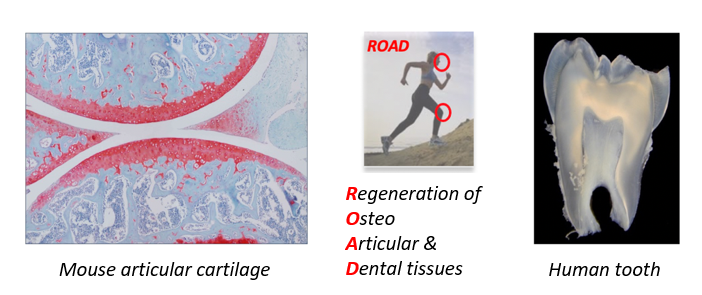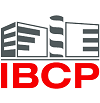Introduction
Bone, cartilage and tooth are tissues that make up the skeleton. The are essential to vital functions that include body growth, organ protection, movement and mastication. Our team focuses on studying the sane and pathological physiology of cartilage and tooth. Together with chemists and hospital practitioners, we are developing a multidisciplinary approach with a clinical scope. This involves nanoparticle-mediated drug delivery, 3D printing, cell therapy and tissue engineering for the reconstruction of articular cartilage, nasal cartilage and dental pulp.

Themes
Our group takes advantage of its long-term studies on chondrocyte differentiation and cartilage development to set up new protocols to repair cartilage, in collaboration with hospitals and industries. More specifically, we analyze :
- Biomaterial functionalization for cartilage tissue engineering (J-D. Malcor)
- Mechanotransduction of chondrocytes (F. Mallein-Gerin)
- Epigenetics during osteoarthritis (J. Lafont)
- Reconstruction of nasal cartilage by additive fabrication and tissue engineering (F. Mallein-Gerin)
- Innovative antibacterial hydrogels for dental pulp regeneration (M. ducret)
- The characteristics of diverse sources of mesenchymal stem cells and their potential to differentiate into skeletal lineages (F. Mallein-Gerin)
Keywords : cartilage, chondrocyte, mechanotransduction, BMP-2 signaling, hypoxia, ingeneering , dental-pulp complex, stem cells
Members : ROAD group
Publications : Publications ROAD group
Contact
ROAD group (osteoarticular and dental research)
Laboratoire de Biologie Tissulaire et Ingénierie thérapeutique – CNRS UMR 5305 – University Claude Bernard Lyon 1
Institut de Biologie et Chimie des Protéines
7, passage du Vercors 69367 LYON CEDEX 07
FRANCE
E-mail : f.mallein-gerin@ibcp.fr
Tel : +33 (0)4-37-65-29-19
Fax : +33 (0)4-72-72-26-04



